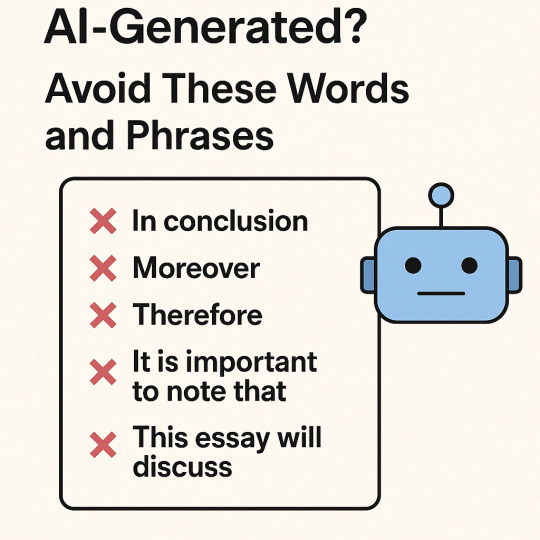#WritingWithStyle
Explore tagged Tumblr posts
Text

#NotebookForWriters#NotebookTherapy#WritingWithStyle#NotebookCrush#NotebookObsession#InspiringNotebook#NotebookGifts#NotebookWithLove#NatureOnPaper#OutdoorInspired#EcoNotebook#ArtisticNotebook#NotebookAesthetic#ScenerySketchbook#NatureVibesNotebook#NotebookArt#SceneryCoverNotebook
0 notes
Text
Don’t Want Your Text Flagged as AI-Generated? Avoid These Words and Phrases
So, you’ve been crafting content with the help of AI—whether for blogs, books, emails, or SEO copy—and everything seems smooth… until a detector flags your text as “probably AI-generated.” Suddenly, your credibility is questioned, your rankings might drop, and your readers may not trust the content as much. But what gives it away? Why do these detectors zero in on your writing and raise red flags?

Here’s the truth: AI detectors aren’t magic. They rely on patterns, language choices, and stylistic quirks that large language models (LLMs) like ChatGPT often produce. If you know what those are, you can dodge them like a pro. Whether you're a marketer, blogger, freelancer, or student, understanding these red-flag phrases can keep your content authentic, engaging, and undetectable.
Let’s break down the language patterns that scream, “This was written by a bot!”—and what to use instead.
What Words Are Getting You Caught by AI Detectors?
You might be surprised how innocent some of these sound. But here’s a quick list of the usual suspects—phrases and words that AI tends to overuse or use in unnatural ways:
1. “In conclusion” This is one of the biggest tells. Most LLMs love to wrap things up with this phrase. But real humans rarely use it outside of high school essays. Instead, try wrapping up with something more conversational, like:
“So, what’s the bottom line?”
“All things considered…”
“Here’s the takeaway…”
2. “It is important to note that…” This phrase might sound formal and neutral, but it’s very robotic. Most people don’t talk like that unless they’re writing legal disclaimers. Try these instead:
“Just a heads-up…”
“Worth keeping in mind…”
“You should probably know that…”
3. “Therefore” and “Moreover” These are classic transitional phrases—but they sound stiff and overly academic. You’re not writing a term paper; you’re writing for real people. Go with:
“So…”
“Plus…”
“That’s why…”
4. “This essay will discuss…” If your content opens with something like this, stop. Unless you’re literally writing an academic essay, it sounds clunky and very AI. Better ways to start:
“Let’s dive into…”
“Ever wondered why…”
“Here’s the deal with…”
5. “Artificial Intelligence (AI) is a rapidly growing field…” This kind of line is a dead giveaway. It’s generic, overused, and screams AI boilerplate. Try something fresher, like:
“AI isn’t just hype anymore—it’s running the show.”
“We’re way past robots taking over—AI’s already in your inbox.”
6. Repetitive sentence structures LLMs tend to follow very predictable sentence patterns. For example:
“AI is useful in marketing. AI can also help in healthcare. AI is changing education.” Humans naturally vary sentence length and structure. Mix it up with short punches, rhetorical questions, or real-life examples.
7. Overuse of hedging phrases like “might,” “could,” “possibly” While nuance is great, AI tends to be overly cautious. A paragraph full of “might” and “could�� feels wishy-washy. Take a stand. Be bold. Own your opinions.
8. Overexplaining or stating the obvious If your paragraph says something like “AI is used in many industries such as healthcare, finance, and education,” it’s likely to get flagged. Why? Because it’s stating something so general that it feels regurgitated.
Add depth, tell a story, or give an opinion. For instance:
“Hospitals are using AI to detect diseases faster than ever, saving thousands of lives annually.”
Why These Phrases Are Common in AI Writing
It helps to understand how and why AI writes this way.
LLMs are trained on massive datasets—from websites to books to academic papers. This means they absorb a lot of formal, structured writing. So when asked to write an article, they default to safe, familiar language they’ve “seen” a million times.
Plus, they’re trained to avoid controversy. That’s why you often see hedging, overly neutral tones, and generalizations. It’s all part of the AI trying to play it safe.
But humans? We love a little edge, voice, and surprise.
Tips to Sound Human (Even If You Use AI)
So, how do you keep using your favorite writing assistant without getting flagged?
1. Add slang or colloquial expressions Even a casual “heck,” “kinda,” “yep,” or “you know?” goes a long way in humanizing your tone.
2. Throw in pop culture references Mentioning Netflix, Beyoncé, or your Starbucks obsession makes your writing feel lived-in. AI struggles with being current or relatable.
3. Ask questions Humans naturally engage readers with rhetorical questions. AI uses them too, but not as creatively. Try:
“Wouldn’t it be great if your content never got flagged?”
“Ever feel like bots are writing half the internet?”
4. Use contractions Don’t write “do not” when “don’t” works better. AI often defaults to formal language, while humans use contractions constantly.
5. Tell a story or share a personal anecdote Even a one-liner like “I once wrote a whole blog post that got flagged—and I couldn’t figure out why until I saw the phrase ‘in today’s fast-paced digital world’ five times” feels more human than 500 words of AI-speak.
6. Break grammar rules (on purpose) Start a sentence with “And” or “But.” Use fragments. That’s how people talk—and write.
7. Read it out loud Seriously, this is the golden rule. If it sounds weird when you say it, it probably sounds robotic when you read it. Edit until it flows like a conversation.
Don’t Do This: Common Mistakes That Trigger AI Detectors
Let’s highlight a few habits you should stop cold if you want to keep your content sounding real:
Don’t overuse the same phrase to start sentences. Mix up your sentence starters. Otherwise, it’s like a metronome ticking—predictable and robotic.
Don’t cram in keywords unnaturally. SEO is still important, but keyword stuffing is another red flag. Fit keywords in naturally, the way someone might say them in conversation.
Don’t write like a textbook. Unless your audience is full of professors, keep it chill. Break down complex ideas like you’re explaining them to a friend over coffee.
Don’t rely on the AI to write the whole thing for you. Use it to brainstorm, outline, or draft, but always put your own spin on it. Edit ruthlessly. Add personal flair.
When Should You Worry About AI Detection?
Truth is, most readers won’t know or care whether you used AI—as long as your content feels valuable and real.
But if you’re in industries like academia, publishing, copywriting, journalism, or SEO, detection tools can affect your credibility, rankings, and even your income.
So here’s when to be extra cautious:
Client work (freelance or agency)
Academic papers and essays
Affiliate blogs trying to rank on Google
Content for strict platforms like Amazon KDP or Medium
Final Takeaway
AI writing tools are amazing. They save time, help you brainstorm, and speed up your workflow. But they’re just that—tools. Not replacements.
If you want to fly under the radar of AI detectors and make sure your content feels like it came from a real person (you), ditch the stiff phrases, bring in your voice, and stay unpredictable.
Remember, it’s not just about fooling a detector. It’s about connecting with your audience. And humans connect best with other humans—not with paragraphs that sound like they were lifted from a corporate brochure.
So next time you fire up your AI assistant, use it smartly, edit fiercely, and speak like yourself.
You’ve got this.
0 notes
Text

#Here are some hashtags for a post about Parker pens:#ParkerPen#LuxuryPen#WritingInstrument#PenLovers#PenCollection#FineWriting#ElegantPen#StationeryAddict#WritingWithStyle#OfficeEssentials#ClassicPen#WritingTools#PenAndPaper#SophisticatedWriting#TimelessDesign
0 notes
Text
Długopis żelowy z kreskówkowym królikiem, 6 sztuk/zestaw

Sprinkle some cute! 🐰✨ Grab the Długopis żelowy z kreskówkowym królikiem 6-pack - perfect for all your adorable notes! 📝 Shop now: https://kawaiibuy.co/uef6i #WritingWithStyle #Kawaii
❤10% OFF Coupon: kawaii10off
📦Free worldwide shipping📦
#cute aesthetic#kawaii#scorpio#aestethic#sanriocore#kuromi#2000s aesthetic#2000s emo#myart#kawaiiaesthetic#decora kid#j fashion#cute blog#small bussiness
0 notes
Text
buy now..
#FloralCover#FlowerPower#FloralArt#NotebookInspiration#NotebookDesign#PrettyStationery#FloralPatternsNotebook#NotebookLovers#NatureInspiredDesign#FlowerJournal#FloralArtistry#FloralNotebookDesign#CreativeStationery#FloralNotebooks#NotebookGoals#WritingWithStyle#FloralPaper#JournalingWithFlowers#ElegantStationery#FloralDecor#NotebookObsessed#FloralCreativity#NotebookWithFlowers#ArtfulJournaling#FloralAesthetic
0 notes
Text
BUY NOW.
#FloralCover#FlowerPower#FloralArt#NotebookInspiration#NotebookDesign#PrettyStationery#FloralPatternsNotebook#NotebookLovers#NatureInspiredDesign#FlowerJournal#FloralArtistry#FloralNotebookDesign#CreativeStationery#FloralNotebooks#NotebookGoals#WritingWithStyle#FloralPaper#JournalingWithFlowers#ElegantStationery#FloralDecor#NotebookObsessed#FloralCreativity#NotebookWithFlowers#ArtfulJournaling#FloralAesthetic#amazon#bestsellerbook
0 notes